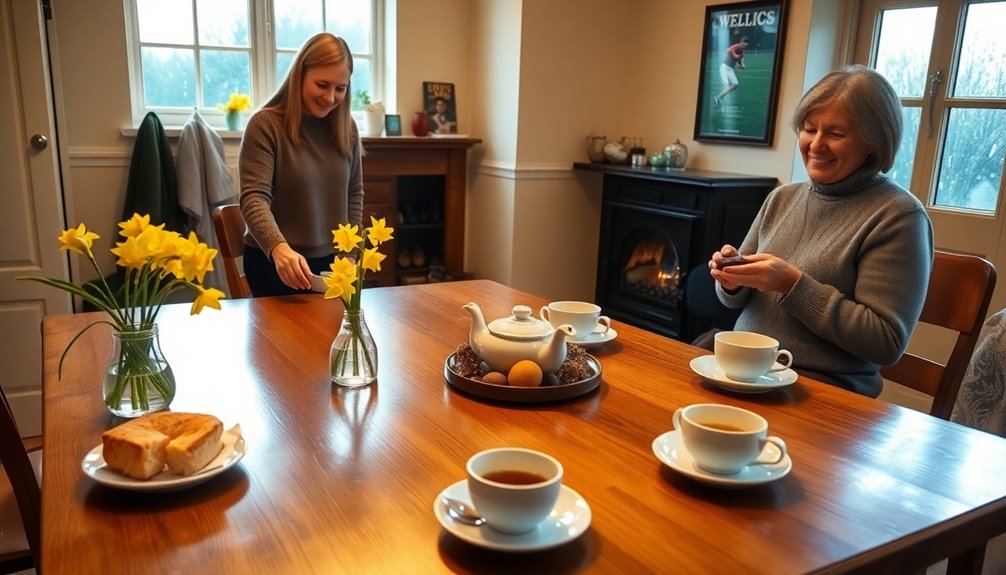
Want to build trust fast and have a calm, enjoyable host family stay? Be reliable, follow house rules, and show up on time. Keep chores and money clear, accept small cultural gestures, and offer help like cooking or errands. Practice 10 minutes of English daily, set quiet-time boundaries respectfully, and address small issues early and calmly. If things repeat or feel unsafe, escalate to a coordinator — keep going and you’ll learn practical ways to improve every point.
How to Build Trust With Your Host Family Fast
Even if you’re nervous at first, start by being reliable: show up on time, follow house rules, and keep your promises. You’ll earn respect fast when actions match words. Invite simple trust building activities—cook a shared meal, offer to help with errands, or suggest a short walk—to create relaxed chances to bond without pressure. Keep open communication: ask about expectations, share your plans, and check in if something’s unclear. Own mistakes, apologize promptly, and propose solutions so issues don’t fester. Balance friendliness with boundaries so you don’t feel trapped; freedom comes from mutual respect. Over time, consistent small choices prove you’re dependable, and that steady trust will make the stay genuinely freeing.
Daily Routines That Make Living Together Smooth
When you settle into clear, predictable routines—like set meal times, shared chores, and agreed quiet hours—everyone knows what to expect and daily friction drops. You’ll want to discuss communication styles openly, decide shared responsibilities, and leave room for flexibility so you still feel free. A brief weekly check-in keeps small issues from growing and lets you renegotiate schedules without drama.
| Morning | Afternoon | Evening |
|---|---|---|
| Quiet time | Errands | Dinner prep |
| Personal work | Shared task | Relaxation |
| Flex hour | Social plans | Clean-up |
Keep routines minimal and negotiable. You’ll enjoy independence while honoring the household, and small predictable rhythms will make communal life smooth and restful.
Quick Language Habits to Improve Your English at Home
Try a daily 10-minute practice where you focus on one skill—speaking, listening, or vocabulary. Label household items in English so you can learn words naturally as you move around the house. These quick habits build steady progress without taking much time.
Daily 10-Minute Practice
Because small, consistent habits add up fast, spending just ten minutes a day on English can make a noticeable difference in weeks. You can choose short, flexible activities that fit your schedule and keep learning liberating, not burdensome. Try daily language immersion by listening to a 10-minute podcast, repeating key phrases aloud, or shadowing a short dialogue while washing dishes. Rotate practice routines so you’re not stuck in a single method: one day vocab flashcards, another day speaking to a host sibling, another day reading a paragraph and summarizing it aloud. Track a simple streak on your phone to stay motivated without pressure. These mini-sessions help you build confidence, fluency, and the freedom to use English when you want.
Label Household Items
If you’ve been doing short daily practices, take that momentum into your living space by labeling common items around the house. You’ll create tiny freedom zones where you learn vocabulary naturally. Pick essential rooms and focus on household organization: kitchen utensils, laundry supplies, doorways, even remote controls. Use clear labels in English, add a translation if it helps, and group items by function so item categorization becomes instinctive. Change labels as you advance — add verbs or phrases like “to wash” or “keep dry.” Make it a low-pressure habit: five minutes each day to read labels aloud, swap words with your host, or quiz yourself. This simple system keeps learning practical, portable, and respectful of shared space.
Respectful Ways to Ask for Privacy and Space
If you need time alone, politely state your needs so your host family knows what you’re asking for. Suggest specific quiet-time boundaries, like hours for studying or sleeping, and be open to reasonable adjustments. Offer simple compromise solutions—swap chores or agree on signals for “do not disturb”—so everyone feels respected.
Politely State Your Needs
When you need privacy or quiet time, say so calmly and directly—your host will usually appreciate clear boundaries more than vague hints. Do a quick needs assessment for yourself: what length of time, what space, and why it matters. Use clear communication: “I need an hour to study in my room” or “I’d like some alone time this afternoon.” Offer a reason briefly and propose a solution that respects household flow, like adjusting shared schedules or signaling availability. Keep your tone firm but friendly, and be ready to negotiate. That shows independence and respect at once, letting you preserve freedom while maintaining harmony. A straightforward request is often the easiest path to mutual understanding.
Set Quiet-Time Boundaries
Building on clear requests, it helps to set specific quiet-time boundaries so everyone knows what to expect. You can propose quiet hours that match your routine—early mornings for focused work or late nights for rest—while asking host family members to share theirs. Frame it as part of family agreements: suggest times, explain why privacy matters to you, and invite brief feedback. Use concise, friendly language: “Can we agree on quiet hours from 10 pm to 7 am?” Point to practical actions—soft voices in halls, headphones for media, doors closed—so boundaries feel doable. Stay flexible but firm; repeating the agreed times calmly when needed keeps trust intact and preserves your freedom without friction.
Offer Compromise Solutions
Although you want privacy, offering compromise shows respect and keeps relationships smooth; propose specific, doable solutions—short notice for alone time, swapping chores so you get a quiet hour, or using a shared calendar for personal blocks—so your request feels fair, not demanding. Say you value cultural exchange but also need solo downtime, then suggest combining shared activities with private pockets: join evening meals most nights, and reserve two afternoons a week for reading or exploring alone. Offer to take on extra hosting tasks when you’re home to balance time away. Be clear, calm, and flexible—ask, don’t insist—and check in after a week to tweak arrangements. That way you keep freedom without disrupting household harmony.
Easy Cultural Gestures That Impress Hosts in Ireland

If you want to make a good impression with minimal fuss, simple polite habits go a long way in Ireland: greet hosts with a warm “hello” and a smile, remove your shoes if they do so, accept offers of tea or a small snack, and say thank you sincerely after a meal or visit. You’ll find Irish etiquette values warmth and modesty, so listen more than you speak and show curiosity about cultural traditions like seasonal festivals and traditional music nights. Try local cuisine politely, praise hospitality customs, and offer help clearing up without insisting. Respect social norms on public transport by keeping noise low. Stay relaxed, be genuine, and you’ll enjoy freedom to explore while building easy, respectful connections.
Managing Money, Meals, and Chores Transparently
Alongside polite habits, clear communication about money, meals, and chores keeps a homestay running smoothly. You want freedom but also respect the household; set upfront agreements about any shared costs, pocket money arrangements, and who buys staples. Use simple budgeting strategies: list recurring expenses, split clearly, and decide payment methods to avoid awkwardness. For meal planning, ask about preferences, rotation of cooking, and whether you’ll contribute groceries or cook certain nights. Agree on chore expectations—what’s daily, weekly, and optional—and how to signal when you’re unavailable. Write decisions down or save messages so everyone’s on the same page. Being proactive lets you enjoy independence while keeping trust and harmony with your host family.
Handling Issues Calmly and When to Escalate
When problems crop up, tackle them calmly and early so small frustrations don’t become big conflicts. You’ll use emotional intelligence to stay clear-headed, name the issue, and suggest solutions that respect everyone’s space and independence. Know when to de-escalate and when to escalate: if safety, repeated boundary breaches, or unresolved financial disputes persist, involve a coordinator or agency.
| Situation | Action |
|---|---|
| Minor annoyance | Address directly and privately |
| Repeated breach | Document and discuss with host |
| Safety/abuse | Escalate immediately to authority |
Practice conflict resolution by listening, stating needs, and proposing compromises. That approach protects your freedom while keeping relationships sustainable; escalate only when informal fixes fail or your wellbeing’s at stake.
Some Questions Answered
Can I Invite Friends Over Without Asking First?
Treat your home like a shared garden: no, you shouldn’t invite friends without asking first. You’ll respect friend etiquette and house rules, keeping freedom alive while honoring boundaries, avoiding awkwardness and preserving trust with your hosts.
Do I Need to Buy Household Items or Will They Provide Them?
They usually provide basic household supplies like toiletries, linens, and kitchenware, but you should bring essential personal belongings and any specific items you prefer; don’t be shy to discuss needs so you’ll stay comfortable and independent.
How Do I Handle Medical Emergencies or Need a Doctor?
Like a calm anchor, you should call emergency contacts first, use first aid if safe, then get professional care — tell your host, carry insurance info, know local clinics, and keep copies of prescriptions for freedom of movement.
Can I Celebrate My Own Cultural or Religious Holidays at Home?
Yes — you can celebrate your cultural or religious holidays at home; it’s a cultural exchange opportunity, so you’ll want to discuss plans with your host family, share holiday traditions respectfully, and keep your independence while honoring their space.
What Visa or Legal Documents Should I Keep With Me Daily?
Keep your passport, visa requirements proof, and important documents like residence permit and emergency contact info on you—like a freedom-lover’s talisman—plus copies, travel insurance, and a digital backup so you’re ready for anything, anytime.
